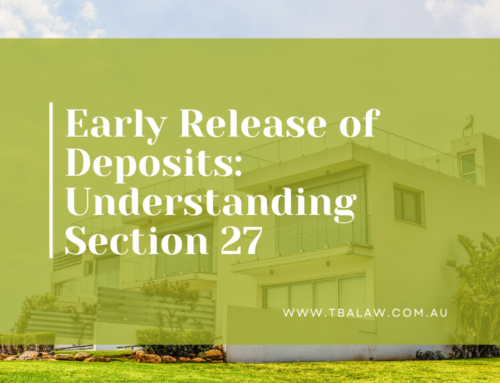Position! Position! … Condition
By Rochelle Manderson
With Real Estate, it is: “Position! Position! Position!” But you should be thinking, “Condition! Condition! Condition!” This blog is about the condition of the property at settlement.
Whether you are buying a property or selling one, there are some contractual obligations you should be aware of from the time you sign your Contract of Sale to the day of settlement. We’ve all done it … been presented with a long and apparently dull contract full of terms and conditions … and not read the fine print. That’s the lawyers job to read that, right? And you sign it. However, what you have just done is agree to every one of those terms of the contract with the stroke of your pen. And unless you tell the lawyer what you’re expect about the property, how do they know to make sure it happens?

What do you need to know?
A property must be in the same condition at the time of settlement, as it was in when the Contract was signed! This blog will briefly discuss the provisions in the Contract that require the property to be kept in the same condition as it was in at the time the contract was signed, fair wear and tear excluded. Vendors, take note!
The Contract for the Sale for Real Estate is generally what we call a standard form contract. This means the general conditions contained within the contract remain the same with each property transfer, unless specifically amended by way of a special condition. When you read your contract, you will likely see the general conditions have either been drafted by the LIV or by the REAV. In either case, the relevant provision you need to look at in this instance is General Condition 24.
Before your eyes begin to glaze over, General Condition 24 is far more exciting than one may first think. This is the provision that requires the Vendor (that’s the party selling the property) to deliver the property and goods to the Purchaser on settlement in the same condition as at the time of sale, fair wear and tear excluded. This should not be onerous for the Vendor, no requirement is made to improve the property, and general household maintenance is all that is required between the sale and settlement.
The Purchaser will conduct their final inspection prior to settlement, and this is where the purchaser should note if there is damage to the property since signing the contracts. If there is damage that is substantial, the purchaser can require the vendor to reinstate the property (ie – fix the damage) prior to settlement. In these circumstances, settlement may be delayed, however, settlement cannot be delayed if the damage to the property is beyond fair wear and tear but is still considered to be only minor damage. Again, the Vendor must remedy this prior to settlement, however there is a second option in these circumstances.
How to make the Vendor comply?
General Condition 24 has a proverbial sting in its tail by allowing funds, up to $5,000.00, to be held back at settlement to restore the property and, hence, remedy the Vendor’s breach. In such circumstances, the purchaser must nominate the amount (up to $5,000.00) to be held by a nominated stakeholder pending resolution of the dispute following settlement. However, in these circumstances, the purchaser must also provide the equal amount to the stakeholder at settlement. This is an incentive for the purchaser to actually deal with the matter quickly and release the balance of the funds to the Vendor.
If you are unsure if the damage constitutes the GC24 treatment, you should be guided by your legal representative. They will be able to assess more accurately whether damage is substantial, minor, fair wear and tear, or insignificant, in your particular circumstances.
What do you need to do?
For a vendor, you should ensure you keep the property maintained in the condition it was in at the time you signed the contracts. If you are at all concerned, you can always take your own photographs on or about the day you sign with the purchaser. So too can the purchaser take photos of their own at this time should they be concerned at all about any part of the property. Remember, estate agent photographs are not indicative of the time of sale.
For the purchaser, your final inspection gives you the chance to view the property and ensure it is in the condition it was at the time of sale. You should not be concerned about a coffee stain, as that is clearly fair wear and tear, however you should be concerned if the bath tub was broken when it had not been at the time you signed the contract, as that is damage. In a worse-case scenario, if a wall had fallen down, you would have substantial damage. If the property has been destroyed or is uninhabitable, the purchaser can rescind the contract under the Sale of Land Act.
Generally speaking, issues such as these are rare, however they can occur. So be alert to the property you are buying, or simply maintain the property you are selling, and your experience should be a pleasurable one.





Leave A Comment